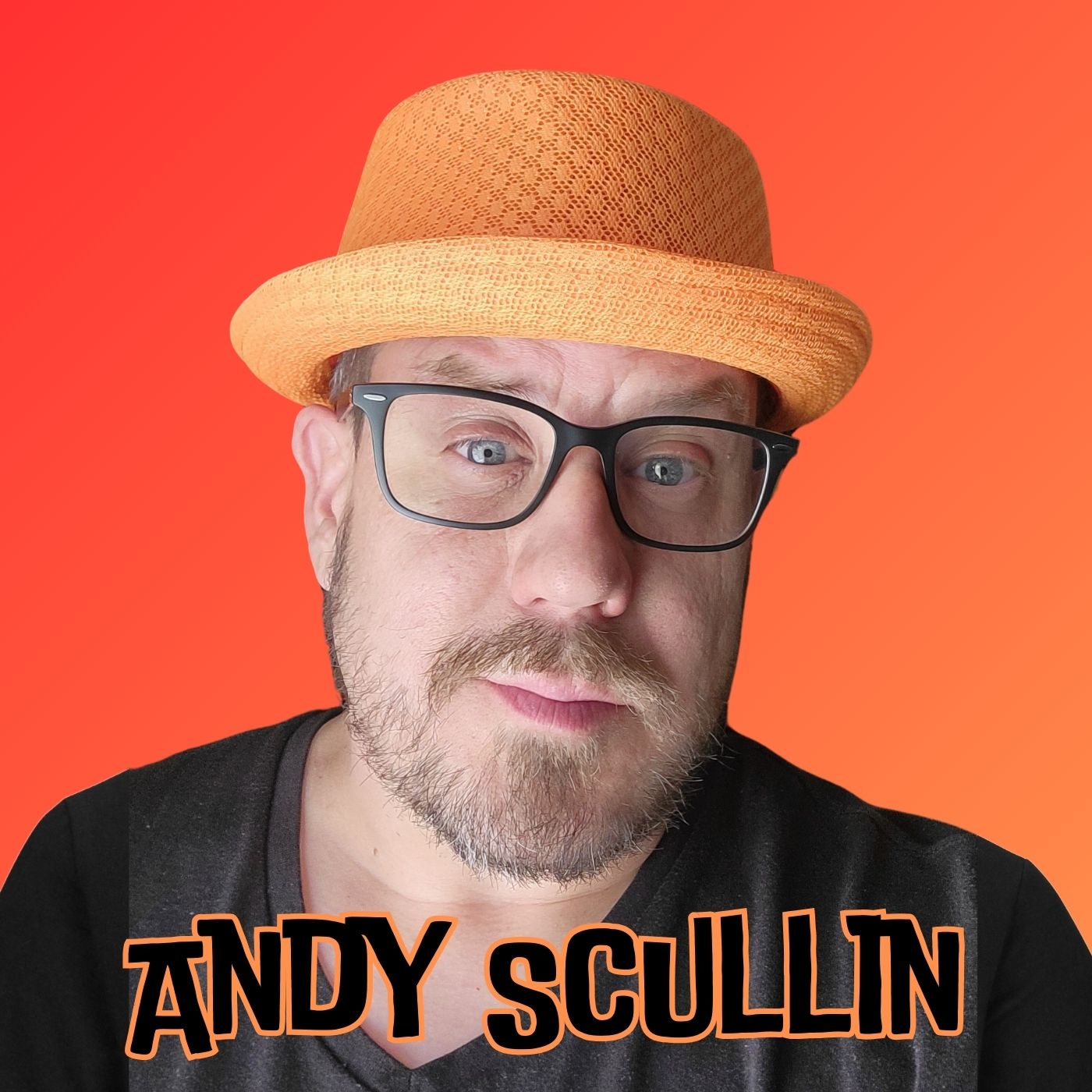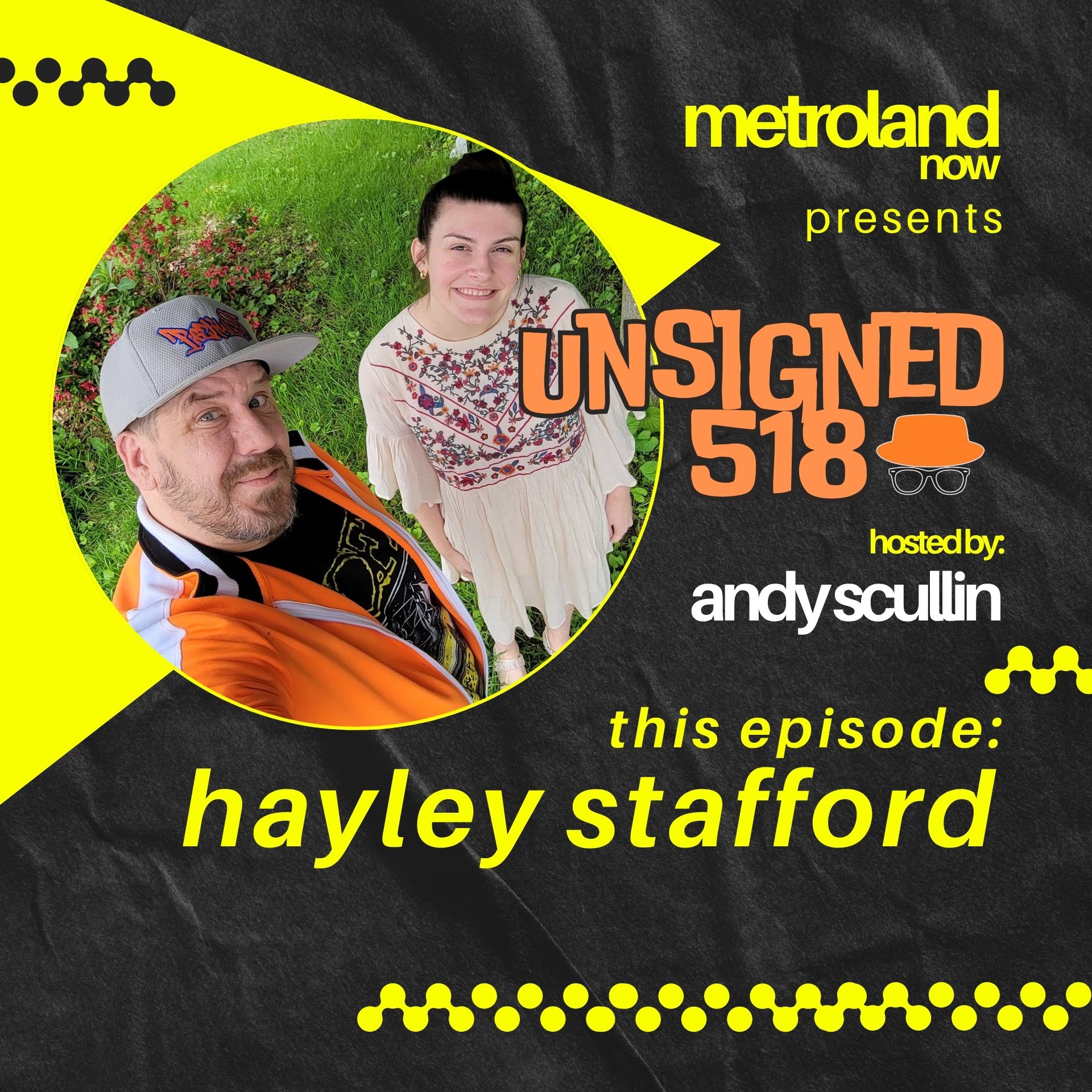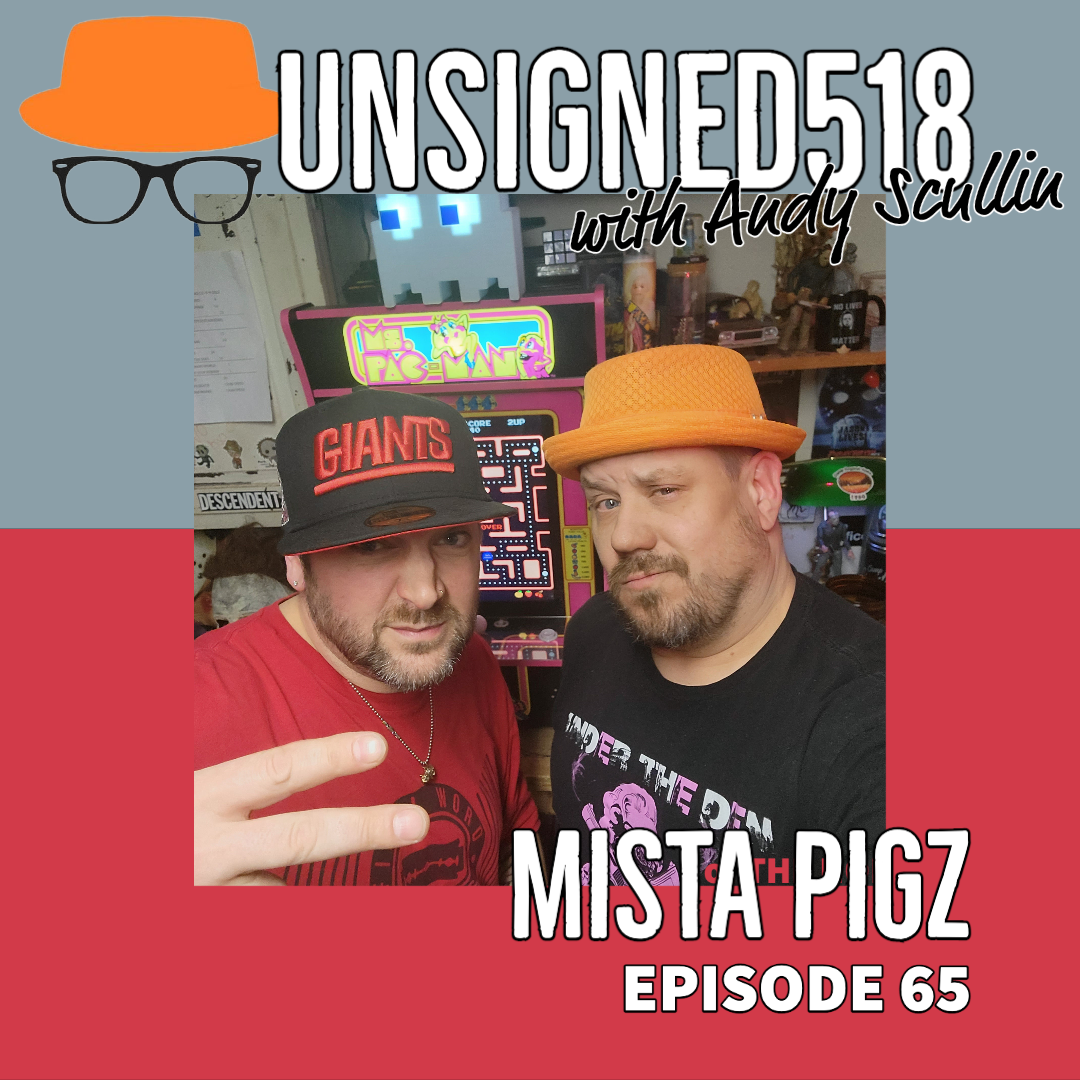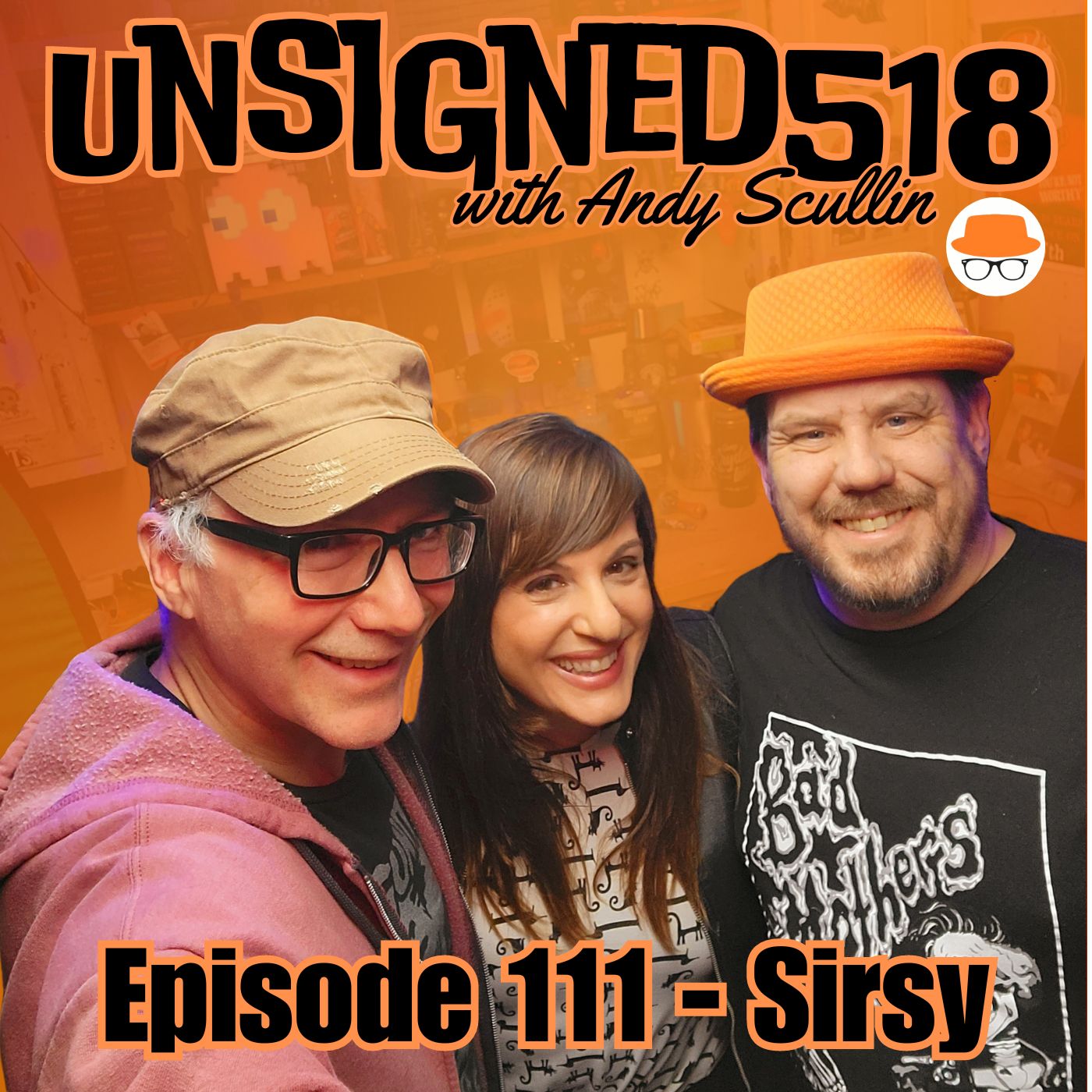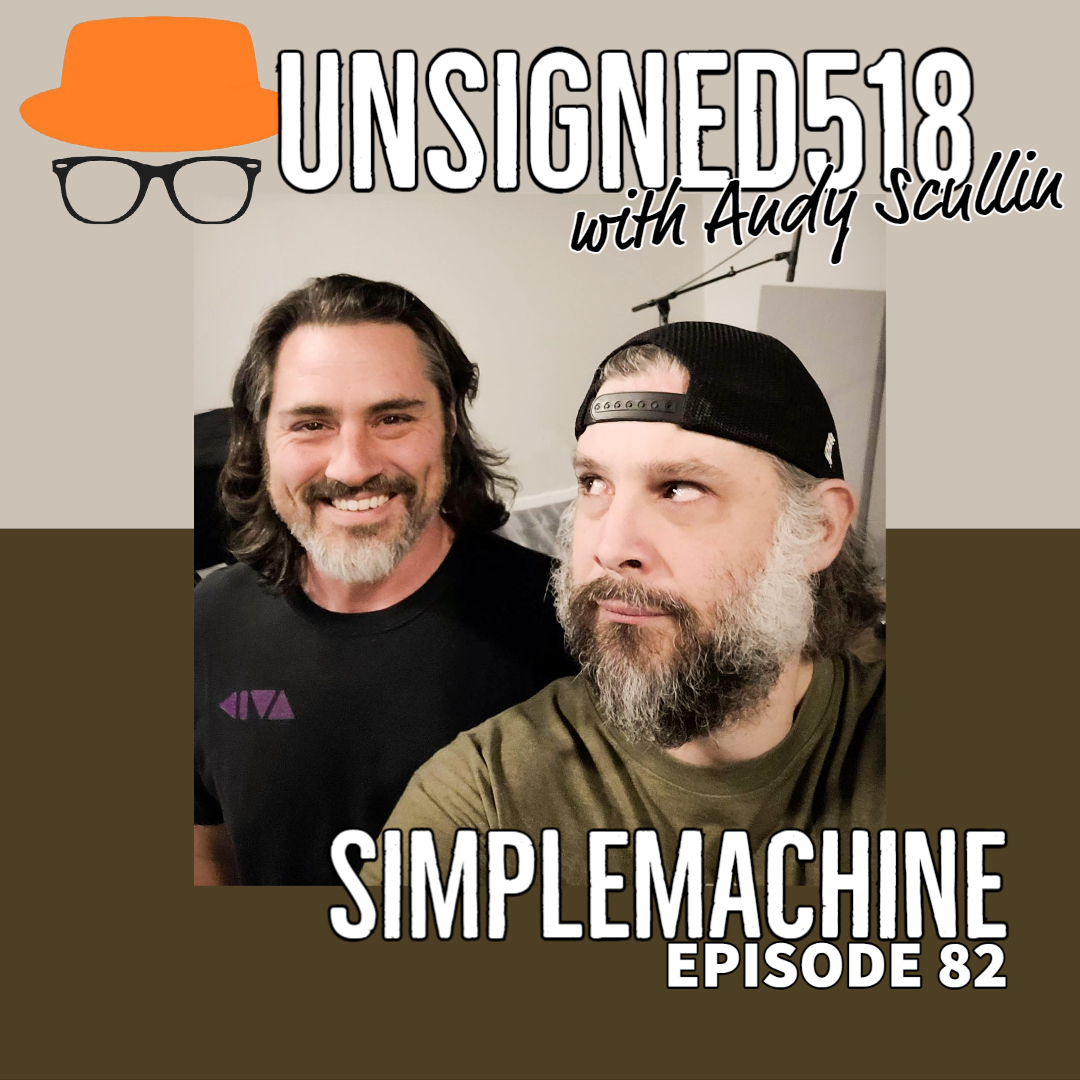[00:00:01] Speaker A: He was born on a Saturday in 73 he loves punk rock music I need to cabin the dazzle Jazz rock Now on the beat guitar with a short wind radio bass his motherfucking envy scrolling look at motherfucker cuz here he comes Andy Sculling wearing his orange hat.
[00:00:27] Speaker B: Welcome to unsigned 51 8. I am here with Haley Stafford. How's it going?
[00:00:32] Speaker C: I'm good, how are you?
[00:00:33] Speaker B: I'm doing well. And you know, I want to thank you first of all for doing this on such short notice. I actually had a quick opening and I just like sent you an Instagram message. I was like, hey, you want to come on the podcast this weekend? And you were like, yeah, totally.
It happened that quick, so I appreciate that.
But you know, as we start the episode, you know, we talked a little bit before we got recording where I said, I just want to know, like, you know, know how you got started in music. I've seen your stuff on Social, I've heard your music and I guess just tell us the story of Haley Stafford.
[00:01:11] Speaker C: Yeah, definitely. That's a long one. But when it comes to music, I guess I've always been kind of a musician since before I can remember. I was like writing little songs in my head as like a 4 year old. And when I was about 9, my grandma got me my first album, which is Speak now by Taylor Swift.
And it inspired me a lot. And I was getting bullied in school when I was in sixth grade, around the time that she got the album for me. And there was a school talent show and I had no history with actual singing. Like I was not good, but I, I was like, I'm gonna stick it to the haters and I'm gonna sing at this talent show in front of my whole school. Didn't change anything, but my pop up was in the audience and he said, I see something special in her, so I'm gonna get her singing lessons.
So then I started taking singing lessons at New York School of music in Walden, New York.
And I kept taking them until I was 18.
And I did like a lot of local stuff with the music school, playing in bands. And I started, I learned guitar and piano when I was like 13, 14 to put music behind my songs.
So I've been in it for a while.
[00:02:43] Speaker B: That's funny because a lot of people do like the opposite. They'll like be like, I really want to learn guitar. Then they learn guitar and then they're like, well, now I have to learn to sing to put. To put. But you know, lyrics to my music. But you did it backwards.
That's really interesting. And now taking, like, vocal lessons, like, just from people listening. Cause a lot of my listeners are singers, you know, and, like, I've always thought it interesting how some people can just do it.
And I've always wanted to. Cause I'm not someone who can just do it. I've always wondered, like, the process of singing lessons and, like, going to school for it, like, beyond just, like, singing. It, like, teaches you, like, muscle and where things come. It, like, literally teaches you how to use your body as an instrument.
From what I've, like, picked up, like, is that. Do you feel that the same with.
[00:03:42] Speaker C: Absolutely.
I've kind of fallen out of technique and stuff, which I'm trying to get back into. Because I think that everyone who wants to sing, at least have long longevity with singing, should take singing lessons. Because if you don't sing properly, right. You could damage your vocal cords forever. So you want to be able to sing for a while if that's what you plan on doing.
And I feel like sometimes people will say, oh, you know, I. I have natural. I don't need singing lessons. Like, I just do it, right. It's like, you can have natural talent, but I.
Singing lessons are really important and shouldn't be ashamed. It doesn't mean that you're, like, not as good because you had to take vocal lessons.
[00:04:30] Speaker B: Right. And I almost think that, like, people with natural talents are. Could probably benefit the most from. Absolutely, you know, or at least could advance the quickest because they're like, oh, I've already got this fucking bass level where I'm like. I'm like, here, you know, just teach me how to get there. Whereas, you know, like, someone like me, if I was to take singing lessons, I would be taking very base level, you know, like, yeah, teacher. I made a punk rock band. Like, I, you know, I don't. I always say, like, I don't have to sing well. I just have to sing loud.
And I do that. But it would be nice to be able to sing well, which. Yeah, but so, you know, you've started early, obviously, with. With music. And then by the time you're like, you know, preteen teenage years, you're now adding instrumentation into it. Like, when does.
Like. And you said you were kind of writing songs like when you were four or whatever. But, like, when you were in those preteen years learning guitar and piano, were you writing your own compositions then?
[00:05:35] Speaker C: Yes, I wrote my first, like, official song with chords on the piano. When I was, Yeah, I think 12 or 13, and it was actually pretty good. I'm not gonna lie. I was like, playing it a little while. I was like, damn.
Yeah.
[00:05:51] Speaker B: And you do you take like. Because I guess, like, as like a songwriter, you know, I mean, I don't know how old you are now, but I'm assuming, you know, 13 is a couple years ago.
Yeah. So, like, a lot of people, when they take like, earlier songs, like, I love that you just said oh, like, it was like, pretty good. Because, like, so many people are like, I hate everything that I wrot wrote. Like, and I think you need to take all, like, keep all that stuff and love all that stuff and be proud of all that stuff because it steps along the way.
[00:06:25] Speaker C: So a hundred percent. And not to bring up Taylor Swift again, but, like, a lot of the stuff that she didn't put on her original albums that she released, like, she has this huge fan base. So now she releases, like, vault tracks and re records her albums. And everybody loves it.
So.
[00:06:42] Speaker B: Yeah. And I mean, that's cool too, to like, embrace your earlier work, especially someone at that status, to be like, you know. Because a lot of people just pretend that it doesn't exist.
[00:06:50] Speaker C: Yeah, I love that. I'm comparing myself to Taylor Swift.
[00:06:54] Speaker B: Hey, you know, like, you gotta, like.
I always.
I've said many times, like, on this show, like, people need to embrace their influences. Like, it bothers me a little bit when people are, you know, like, oh, you know, I. I don't really listen to a lot. It's like, no, you listen to music and you have influences and, like, embrace them, you know, and be like, yeah, so compare yourself to Taylor Swift. That's a great comparison. You know, do it like, I love it.
And we're talking now, you know, so now that I've got an age range. So for the last 10 years, you've been playing guitar, writing songs, doing piano. Like, do you have a preference as to which one's your main instrument or are you back and forth?
[00:07:43] Speaker C: I would say it was piano and it's shifted into guitar because the guitar is so easy to, like, lug around and so easy to play.
I definitely switch back and forth. Like, I have periods where for a couple years I only write songs on the piano and a couple years where I only write songs on the guitar.
I'd say right now I mostly use the guitar.
[00:08:05] Speaker B: And how much of a catalog do you have that's like, out that people can get?
[00:08:11] Speaker C: I only have one song out right now.
It was recorded, mastered, and Produced by Shannon Taya. She's extremely talented. I listened to her episode, actually.
[00:08:22] Speaker B: Yeah.
[00:08:23] Speaker C: When it came out, but.
But, yeah. So it's just the hospital right now, but I am in the process of recording three other songs, and I have.
I was running the numbers, and I have, like, 80 songs that are either finished or mostly finished. So I have enough to, like, record and, like, basically fill a career already. I just need to record them and put them out there.
[00:08:49] Speaker B: That's cool, though, to be at that point, you know, to be like, all right, now, you know, you've been a songwriter and a performance artist, and to be like, now I'm gonna be a recording artist.
[00:08:59] Speaker C: It's exciting.
[00:09:00] Speaker B: And, you know, to have, like, that point to be like, now. Now we're doing this and already have a catalog, because a lot of people don't have a. Have a catalog, you know, then they're like, oh, I don't know. We got to write some stuff because we got studio time. So you have plans now for a couple more. Yeah, a couple more singles, and then.
Then, who knows? Maybe an album.
[00:09:21] Speaker C: 100%. That's what I'm working towards is I want to record at least 12 songs. I have a vision board that I've had for a couple years of, like, the album cover, the songs that are going to be on it, the exact inst.
The way it's going to be produced, and stuff like that.
So once I have the songs, I'm locked and loaded. Good.
[00:09:43] Speaker B: Yeah. That's awesome. And then you can slowly release your vault songs.
[00:09:46] Speaker C: Yeah.
[00:09:50] Speaker B: Exactly. So embrace that comparison. That's awesome.
So we're not, you know, today we're not going to hear the Hospital, but that is out on streaming. But you're going to play some songs live, or is that one of the songs you're going to play live?
[00:10:05] Speaker C: Yes, it is.
[00:10:06] Speaker B: Wow. All right, cool. That's awesome.
So we're talking now.
What is it? I'm like, what year is it? 2025. You're, like, one song out, and now there's three, you said already in the works. Are they recorded, just not mastered or.
[00:10:27] Speaker C: Well, all three are kind of being recorded and mastered at the same time. My first official studio session was actually last Tuesday or this past Tuesday.
[00:10:35] Speaker B: So that's pretty.
[00:10:38] Speaker C: I'm so excited about it to be.
[00:10:39] Speaker B: Like, oh, I'm catching you right at, like, the launch point, the up and up.
[00:10:43] Speaker C: Yeah.
[00:10:43] Speaker B: Because releasing music is.
It's an exciting thing, and, you know, even though it's difficult to do it, like, you know, Yourself or whatever. To have that control over what you put out.
[00:10:58] Speaker C: Yeah.
[00:10:58] Speaker B: Is amazing. 110 years ago, you couldn't do that.
[00:11:04] Speaker A: Yeah.
[00:11:05] Speaker B: Or I guess maybe 10 you might have been able. But I'm old. Like, no. 20. 20, 25 years ago, you definitely couldn't put your own stuff out and have people hear it.
[00:11:16] Speaker C: Yeah. It wouldn't get attention like you could, but.
[00:11:19] Speaker B: Sure. But now you know you can put it out and you can. You have listeners on other continents that are, like, digging your shit.
[00:11:27] Speaker C: Yeah. Social media and stuff.
[00:11:28] Speaker B: Yeah. Yeah. It's fun. What a time to be alive.
But so since you brought your guitar and we're gonna hear some songs, what was the first one that we were gonna hear?
[00:11:38] Speaker C: It's called Moonbeams.
[00:11:39] Speaker B: Okay. You want to tell us a little bit about it before you play it?
[00:11:42] Speaker C: Yeah.
It's about sleepless nights when you just get really angry because you can't fall asleep. And then you're like, whatever. I'm just gonna take a walk outside at night, which I don't recommend, but I took a walk outside on one of those nights and I started talking to the moon like a crazy person. And I wrote a song about it and how it could feel comfort, comforting. And you can feel like a main character when you're sad.
[00:12:11] Speaker B: I love it. All right, so let's hear Moonbeams live here in the dazzle den from Haley Stafford. And then we'll be right back.
[00:12:20] Speaker A: O moon, don't look away.
Shadows fall behind me from your gaze.
[00:12:36] Speaker C: It's pretty here.
[00:12:39] Speaker A: And it's cold and I came.
Cause I wanna be alone.
And it's like arm place.
It's like home in a stranger's face.
It's like the soft fall of a million stars. Snow flames, moon beams reaching down. Don't look away.
Right now I feel safe.
Oh moon, I see clear as day.
You're crevices and craters Molded clay.
I live in fear and I'm old and I came here because I'm completely gone.
And it's like one pinnacle play.
It's like home in a stranger's face.
It's like the soft fall of a million snowflakes.
How moonbeams reaching down. Don't look away.
Right now I feel safe.
Time has taught me how to grow But I'm still holding on.
People, places, memories and things that are long gone.
This winter's night is chilling to the bone.
And it's hard to feel like I'm not completely alone.
Cause it's like warm in a cold place.
It's like home in a stranger's face.
It's like the letting go of a million mistakes I hope Reaching down Don't look away, you make me feel safe.
[00:15:35] Speaker B: All right, that was Moonbeams live here in the dazzle. Dan Haley Stafford. And that one is gonna be one of the singles that you're working on that'll be released as a studio version, right?
[00:15:46] Speaker C: Yes.
[00:15:46] Speaker B: That's awesome. And so we're gonna have you play another song, and the reason we're kind of jumping into the other song so quickly is that there's gonna be a story behind it that we wanted to kind of spend some time, maybe dedicate the segment leading up to the song to, I guess, the backstory of the hospital. And the Hospital is one that's available now out on streaming, but you're gonna play it live here. But I guess tell us the story of the hospital.
[00:16:16] Speaker C: Yeah.
So I have struggled with mental health for most of my life, and I've been to the psych hospital about 11 times since I was 13, and I feel like that's not something that people should feel ashamed of. I feel like it's.
Getting help is something that you should feel proud of and, you know, like, a reminder that you're still here and you're strong, and everybody struggles with things. Like, I've met people in the hospital who are doctors and nurses and moms and professors and veterinarians. Like, no matter who you are or who you're talking to, you never know who might be struggling.
And, yeah, so I've met some of the most amazing people that I've ever met, some of my closest friends through mental health treatment.
And.
And it's a really. It's a really scary experience at first because it's like you. And, like, you're in the darkest moment of your entire life, and then you are in a totally different setting, and you're not in your home, and you're kind of away from the world a little bit, which is. It's kind of good to get a break from reality. And then you're kind of thrown into group therapy, and there's, like, 10 people that you don't know. But once you get into a routine and you. You're around people who struggle with similar things that you do and that you're there for, it's like, it's so healing and beautiful and it's not talked about enough because it's kind of frowned upon or people are ashamed, which isn't their fault.
[00:18:18] Speaker B: But, yeah, you know, and you. You know, I Guess we don't have. You don't have to answer if you don't want to, but how.
How does it feel, like, upon first arrival? Like, you said, you're in your darkest spot. Like, how does it feel to take, like, your emotion, your whole everything, and have people look at it clinically?
Is that a mind fuck on its own?
[00:18:43] Speaker C: Yes.
And I would say about 50% of the time, it's people who have been in the mental health field since way before DBT and good therapy has entered the psych hospital world.
So sometimes you're met with a little judgment and. And it never.
It never feels normal when you're, you know, the process of, like, you're alone in a waiting room, and then someone comes up to you and they're like, so why did you just have a really horrible time and want to.
[00:19:18] Speaker B: Right.
[00:19:19] Speaker C: So it's. It's very. Like you're kind of in shock, but you're also, like, by the time you're there, it's so. You're so exhausted that you're just like, whatever.
Yeah. And it's like you get just A random person meets you in the waiting room, like, when you're first in the admission process, and they're like, okay, give us your phone, Anything on you, and we're gonna put it in a little box. And tell me about your entire history of your mental health and your family's mental health. And, you know, can you. Oh. One of the things they asked the last time I was there was, can you spell the word orange backwards?
And I was like, girl, no, not on a good day.
But it is. It's very shocking. But by the time you get to group, it's like, at least I am just, like, desperate for human interaction.
And the groups are so good. Depending on what hospital you go to, I would advise not being in an emergency room psych ward for a long stay.
[00:20:28] Speaker B: Right.
[00:20:29] Speaker C: Because it's.
Things need to change a lot.
But.
[00:20:36] Speaker B: And like, that's the thing, too, is, like, what gets me is they expect you to say the things to a stranger.
[00:20:45] Speaker C: Yeah.
[00:20:46] Speaker B: That you have not been able to say to people close to you.
[00:20:51] Speaker C: Yeah.
[00:20:51] Speaker B: And they want you to say it now.
[00:20:53] Speaker C: Yes. Very fast.
Very fast.
[00:20:57] Speaker B: Ease into it. Like, that's. It's. That shit. Like, that is crazy to me. It's just. It's just like a turn and burn system. They're like, all right, get. Get you through. And it's like, no, this needs to be handled differently than, you know, a tooth extraction or stitches. Yeah.
[00:21:16] Speaker C: Yeah.
[00:21:17] Speaker B: It's not the same.
[00:21:18] Speaker C: And.
And they'll ask you the most insane personal question from like. Like, what's your first childhood trauma of this event? And I'm like, girl, I have not told anyone about that. And I don't want to think about any of this. Right.
Yeah. I just met you five minutes ago. I've actually never thought about how weird that is.
And I wish that that process would happen, like, much later into this day.
[00:21:50] Speaker B: Yeah.
The reason that's like an interesting, like, yeah. And like, I know the.
The rapidity of getting you in and out.
[00:22:00] Speaker C: Yeah.
[00:22:00] Speaker B: They just want to like, oh, yeah. Wrap it up. And like, do. And like, how much that is.
It's not good.
[00:22:07] Speaker C: It's not.
[00:22:08] Speaker B: It's not good. It's not healing. It would be if they took their time.
[00:22:13] Speaker C: Yeah.
[00:22:14] Speaker B: And you know, like. But again, it's the system. They're just like, it's a money making.
This is. This is a funny, funny conversation for a local music podcast. But I'm here for it. I'm like, totally. I'm totally here for it.
[00:22:27] Speaker C: I know it's my first post on Instagram is like, here's all my trauma. So it's funny that I'm talking about, like, yeah, when I first meet people, this person at the psych hospital, it's like people I've never met before. I reading everything.
[00:22:39] Speaker B: But I love, I love that, you know, because it's just like, here. Here it is. You know, not ashamed. Right. It does remove like that. That stigma. And even if you get just like one person to be like, wow, this girl's just like owning it, I'm gonna do it too. Like, even if there's one person.
You did it, you know, So I think it's cool. I mean, you wouldn't be sitting here on the podcast without those posts because that's where I first saw you. And I was like, oh, this is. She's a very interesting. Yeah, totally. Absolutely. Just like organically in my feed.
[00:23:14] Speaker C: Yeah.
[00:23:14] Speaker B: And I was like, oh, that's it. That's. And then I was like, oh, she's local. And like, so that's.
That led you to. To here.
And for me having this delicious coffee that you brought me behind the scenes stuff. Haley brought me a cup of coffee and it's kind of awesome.
So is there anything else that you want to add before we hear the hospital live here?
[00:23:38] Speaker C: Oh, just that if you are in this area and you are seeking psychiatric treatment, I recommend Four Winds Psych Hospital in Saratoga or Four Wind Psych Hospital in Katona, New York.
[00:23:49] Speaker B: Cool. And I'll actually, I can link to those in the show notes, so that would be amazing. Anybody listening can just go wherever, wherever, whatever platform you're listening, just go to the show notes and I'll link to that.
[00:24:02] Speaker C: So thank you.
[00:24:02] Speaker B: Yeah, no problem.
Alright, so let's hear the hospital live here in the dazzle then. And then we'll be right back to wrap it up.
[00:24:12] Speaker A: Take your pills, heal the pain and swallow them away.
Or leave them under your tongue.
Heal the hurt in your brain cause it'll drive you insane.
Or just leave all your things and.
[00:24:32] Speaker C: Run.
[00:24:35] Speaker A: The waiting room lights hit your eyes all the same while the air is infecting your lungs.
Clipboards, monitors, well paid doctors. Their hands like ice weaving up as you carry the pain.
[00:25:01] Speaker C: Think too young.
[00:25:07] Speaker A: Make some friends, read through but don't smile too soon or you'll be the crazy one.
Everything else and we're all here like you just outcasts whose minds are gone.
Clipboards, cold energy exposure therapy. Well this has been real fun as I carry the bait.
Pink too young.
Needles and rolls and people who knew we didn't have a chance at all.
Blood work then laughs Time goes by so fast and before you know it you fall in love with the patients, the hospital lights.
You fall for the talking in the cold lonely night.
You heal from the pain of being stuck when you were too young.
[00:26:52] Speaker B: All right, that was the hospital. Haley Stafford live here in the dazzle den. And Haley, I want to thank you so much for coming over here and doing this and being so candid about your story. Like, I do think it's super important.
And even though I was certainly not going to press the issue, a very small part of me was I really hope she talks about the mental health issue in language.
I'm glad it worked out.
I wasn't going to bring it up, but I was like, yeah, absolutely. Because to me it's absolutely important and everybody does go through their things and I think a lot of people, if they spoke up and asked for help then it would just be a much simpler thing and we do need to take the stigma out of it. And so I appreciate you taking the, taking the stand for that. It's awesome. But before we go, I want to give you a chance to say what I refer to as your gratitude. So microphone is all yours.
[00:27:48] Speaker C: So I said I'd like to thank the Academy.
Just all my local music friends up here who I've met in the past couple years have been so welcoming and amazing.
Too many names to list, like, right now. My boyfriend, who I actually, he's an incredible musician and I met him at an open mic two years ago and he. No one has ever been as supportive as you. He's right here.
[00:28:16] Speaker B: Yeah, he's sitting right next to her.
[00:28:20] Speaker C: And also my singing teachers, when I was in music school, they always, like, believed in me before I believed in myself and would tell me that the world needs to hear my music. And that has kept me, actually encouraged me to get help and keep going. And all my friends that I've met in the hospital, I love you. Okay.
[00:28:42] Speaker A: Awesome.
[00:28:43] Speaker B: All right, so she is Hailey Stafford. I am Andy Scullin, this is unsigned 518 and I'll see you on the road.
Unsigned 518 is produced and hosted by me, Andy Scullin. New episodes are available every week wherever you stream podcasts. If you'd like to help support the show, please like and subscribe wherever you are listening. Or you could buy me a
[email protected] unsigned 518 if you would like to advertise on the show, send me an email at unsigned518mail.com and to be a guest on the show, reach out to me Through Instagram at unsigned 51 8.
Take care of one another and I'll see you next week.
[00:29:28] Speaker A: And sculling.
